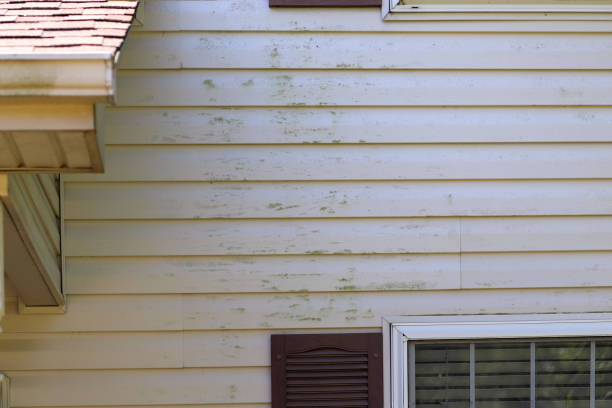Your home’s siding is one of the first lines of defense against the weather, and it’s important to keep it in good condition. It plays an important role in protecting your home from the elements, but it can be susceptible to damage over time. If your siding is damaged, it can lead to all sorts of problems, including water damage, pest infestations, and even structural damage. In this blog post, we will discuss the top seven causes of siding problems and how to avoid them!
Common Causes of Siding Problems
Pests
One of the most common causes of siding problems is pest infestations. Insects like termites and carpenter bees can burrow into your siding, causing extensive damage. Rodents like squirrels and rats can also gnaw on your siding, causing holes and damage. To avoid these problems, you should regularly inspect your siding for signs of damage and repair any damage promptly; try using insecticides or hot water running through a spray nozzle at 160 to 180 degrees. You should also consider using pest-resistant siding materials, such as Cedar or Vinyl.
Moisture
Another common cause of siding problems is moisture damage. If your siding is not properly sealed or if there are any gaps or cracks, moisture can seep in and cause the material to rot, warp, or swell. This can lead to severe structural problems down the road. To avoid this, you should ensure your siding is properly sealed, and there are no gaps or cracks. You can also use a moisture barrier to help keep moisture out.
Bad Maintenance Habits
If you don’t regularly clean your siding, it can accumulate dirt, dust, and debris. This can lead to mold and mildew growth, which can weaken the material and cause it to break down over time. Additionally, if you don’t regularly inspect your siding for damage, you may not notice problems until they’ve become severe. To avoid this, you should clean your siding at least once a year and inspect it regularly for any damage.
Improper Installation
If your siding is installed improperly, it can lead to several problems. For example, if the panels are not level, they may allow water to seep in behind them, which can cause rot and mold growth. Additionally, if the panels are not properly sealed or fastened, they may become loose over time and blow off in strong winds. To avoid these problems, hire a qualified contractor to install your siding.
Weather
Bad weather can take a toll on your siding. High winds can loosen or damage panels, while hail can dent and break them. Heavy rains can also cause water to seep in behind the siding, leading to rot and mold growth. To protect your siding from the elements, you should have it inspected and repaired regularly.
Roof Issues
One of the most common causes of siding problems is roof issues. If your roof leaks, it can cause water to seep behind the siding and damage the structure. Additionally, if your gutters are clogged, it can cause water to build up around your foundation and potentially damage your siding. To avoid these problems, you should have your roof inspected and repaired regularly and ensure your gutters are clean and free of debris.
Fading
The sun can cause the color of your siding to fade over time, making it look old and worn. To protect your siding from fading, you should use a high-quality paint or sealant. Additionally, you can use awnings or other shading devices to protect your siding from direct sunlight.
Loud Siding
If your siding is making loud noise when it rains or when the wind blows, it is a sign that it is not properly installed. To avoid this problem, you should ensure that your siding is installed by a professional. Additionally, you should check the installation regularly to ensure that it is still in good condition.
How to Generally Avoid Siding Problems for All Siding Materials
A variety of factors can cause siding problems, but there are some general tips you can follow to avoid them:
- Make sure that your siding is installed properly by a professional.
- You should regularly inspect your siding and repair any damage that you see. It would help if you also used high-quality paint or sealant to protect your siding from the elements.
- Be sure to clean your siding regularly to prevent dirt or debris build-up.
Contact a Siding Replacement And Repair Contractor to Fix Any Siding Issues
If you’re experiencing any siding problems, it’s important to contact a professional siding contractor. They will be able to properly assess the damage and determine the best course of action.
We’re the go-to contractor for installing siding professionally at Phoenix Siding, whether vinyl, cedar, fiber cement, or Hardie Plank. Our team is committed to providing exemplary customer service, and our reviews are proof of that.
Our siding solutions will help you avoid the typical siding problems at phoenix siding. We have years of experience professionally repairing and replacing siding of all types. We only work with the best materials, so contact us today and let’s talk about your siding needs.



